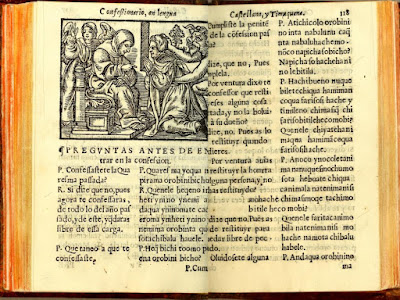A year ago I wrote about linguistic isolates -- single languages, or small clusters of related languages, that have no apparent relation to any other language on Earth. The problem, of course, is that being spoken by only a small number of people, these are some of the most endangered languages. There are many of them for which the last native speakers are already elderly, and there's a high risk of their going extinct without ever being thoroughly studied.
And as I pointed out in my post, the sad part of that is that each one of those is a lens into a specific culture and a particular way of thinking. Once lost, they're gone forever, or only exist in scattered remnants, like the fossils of extinct animals. What you can reconstruct from these relics is perhaps better than nothing, but still, there's always an elegiac sense of what we've lost, and what we're still losing.
This topic comes up because of an article in Smithsonian sent to me by a friend and frequent contributor of topics to Skeptophilia, about some linguists who are trying to reconstruct the extinct indigenous Timucuan language of northern Florida. Timucuan was a linguistic isolate, and seems to be unrelated to the languages spoken by neighboring groups (such as the Seminole, Muscogee, and Choctaw). The Timucua people, which at the time of European contact in 1595 comprised an estimated 200,000 people in 35 chiefdoms, each of which spoke a different dialect, was decimated by war and by diseases like smallpox. By 1700, there were only about a thousand Timucuans left, and the slave trade eradicated those few survivors. There is currently a genetic study to see if some populations in Cuba might be the descendants of the Timucuans, but so far the results are inconclusive.
This would just be another in the long list of complete and irretrievable cultural loss, if it weren't for the efforts of linguists Alejandra Dubcovsky and Aaron Broadwell. Working with a handful of letters written in Timucuan (using the Latin alphabet), and a rather amazing bilingual document by Spanish missionary Francisco Pareja called Confessions in the Castilian and Timucua Language, With Some Tips to Encourage the Penitent, they have assembled the first Timucuan dictionary and grammar, and reconstructed how a long-gone people spoke.
Which is incredibly cool, but there's also a wryly amusing side to it, because with Dubcovsky's and Broadwell's knowledge of the Timucuan language, they're able to compare what Pareja wanted the translators to say with what they actually did say. "Our favorite is the description of marriage," Dubcovsky said. "The Spanish side asks very clearly, 'Have the man and a woman been joined together in front of a priest?' And the Timucua version of that sentence is, 'Did you and another person consent to be married?' The Timucua translation not only takes out any mention of gender, but it also removes any mention of a religious officiant. A priest did not write this, because a priest does not forget to include himself in the story."
So the Confessions document is not only a Rosetta Stone for Timucuan, it gives us a fascinating window into how the Timucuan translators saw the Spanish Catholic culture that was being imposed upon them.
It's tragic that this language and its people were so thoughtlessly (and ruthlessly) eradicated; worse still that such tragedies are all too common. So it's all the more important that people like Dubcovsky snd Broadwell work to resurrect these extinct languages from the scant fossils they left behind. It can't ever repair the damage that was done, but at least allows us to glimpse the minds of an extinct culture -- and to honor their memory in whatever way we can.
****************************************


No comments:
Post a Comment